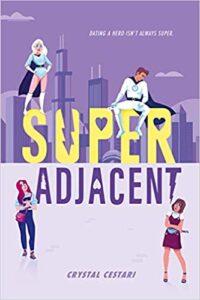Amazon Affiliate Link | Bookshop.org Affiliate Link
Content warning: ableism
Super Adjacent is set in an alternate United States, one in which an official organization of superheroes protects citizens from villainous attacks. Enter Claire: the ultimate Warrior Nation fangirl, she has dreamed of joining the organization since she was ten years old. She’s a regular, non-powered person, but a massive fan. When she becomes an intern, she quickly begins falling for the new hero, Joy, or Girl Power. It’s a massive contrast to the second main character, Bridgette, long-time girlfriend of hero Vaporizer (Matt). The relationship has taken too much from her, and now Bridgette wants out.
This takes a tongue-in-cheek approach to a super story reminiscent of the Silver Age. This was the 1960s and 1970s in mainstream comics, a reintroduction of superheroes who had fallen out of fashion after World War II, and some titles embraced all the potential silliness in those stories. Others, however, gave their characters flaws and inner demons.
That’s where Super Adjacent falls. To Claire, superheroes are larger-than-life figures. Major wow. The book does a great job world-building with things like forum updates, fan theories, and transcripts from news reports. Claire uses fandom jargon that sets her apart from the more corporate aspects of the superhero world. To Bridgette, though? This is old news. She never signed up to be a superhero’s girlfriend, just stayed with her boyfriend as he became a hero. She sees the darker side of it all: both the constant kidnappings of a superhero’s girlfriend and the harassment from his fans. Cestari definitely knows about fandom toxicity.
This is also, unapologetically, a romance. In that way, Claire and Bridgette are perfect foils. Claire is coming into a romance with a superhero; even so, a brief enemies-to-lovers spares her being purely overwhelmed by that super-ness. Bridgette has been worn down by the world of heroic bureaucracy.
I’m not usually one for romances, but there’s quite a bit surrounding it: from kidnappings to art exhibits to GPAs. More than that, it’s painfully realistic. This is the sort of book that came into my life just when I needed it. Having recently ended a relationship, I found it cathartic and validating to read about Bridgette and Matt’s downward trajectory because neither is vilified. They’re just two people who care about one another but aren’t romantically compatible anymore. And that’s portrayed as okay, as it should be.
Thus far, I’ve talked about the first two-thirds of the book, and if that were all, I’d rate it at four stars—a fun, quick read with its own quirky take on superheroes. The characters are distinct and if intense situations are over with a little too quickly, that only contributes to the normalization of a heroes-and-villains setting. Unfortunately, there are some significant drawbacks to this book.
The actual plot follows flat. This isn’t a massive issue because this isn’t a book one reads for the plot. The major challenge listed in the summary doesn’t happen until two-thirds of the way through. Theories, reveals, and disasters all occur at breakneck speed. It’s very well foreshadowed, with hints dropped throughout, the problem is that for two-thirds of the time, this is a romance within a superhero context. Non-powered people didn’t seem like they were second-class citizens, there was nothing to prove; having an action aspect to this storyline felt unnecessary. My attention slipped frequently, which is weird to say about a life-or-death scenario!
The more egregious issue is a consistent undertone of insensitivity. Sometimes it just feels lightly misogynistic, the sort of thing an author might include as an internalized social attitude without really thinking it through—one of the superheroes is clearly more interested in fame and attention, and gets judged harshly for it. Personally I found this distasteful as, at the end of the day, if someone is a superhero who protects the innocent and saves lives, I’m not going to fault them for vanity or ambition. What bothered me considerably more was a character who was portrayed as useless, incompetent… and likely autistic. He’s a has-been superhero whose power involved esoteric knowledge (almost like a hyperfixation), whose contributions were often off-tone and unhelpful (inability to read social cues). This was just a bit uncomfortable until a crisis hit and this character was found hiding under his desk with stim tools. For those not aware, stim tools help some neurodivergent people to focus. I used to fold origami or knit during class, for example; now I bring an infinity cube or tangle to meetings. These activities help divert some excess energy and allow me, and other people like me, to better contribute and participate. Yes, they can help with emotional overwhelms as well, but that wasn’t the portrayal in the book, especially as that scene included the character outright lying and not knowing about technology in his own office. Something associated with neurodivergent people was coupled with the absolute height of this character’s uselessness. It’s just one scene but it felt unnecessary and cruel.
This is a tough book to sum up. It has strengths which are on display for most of the read, making it overall enjoyable. Yet it also has these flaws that can significantly impact the reading experience. I appreciated the sense of immersion in a world in which being super-powered and being queer were normalized, but found myself robbed of a positive experience from the ableism; I enjoyed the romance far more than usual, yet found the plot dull and unengaging. It’s not a bad book. It gives a great vicarious experience of dating Supergirl. But it’s a tough one to recommend all the same.

